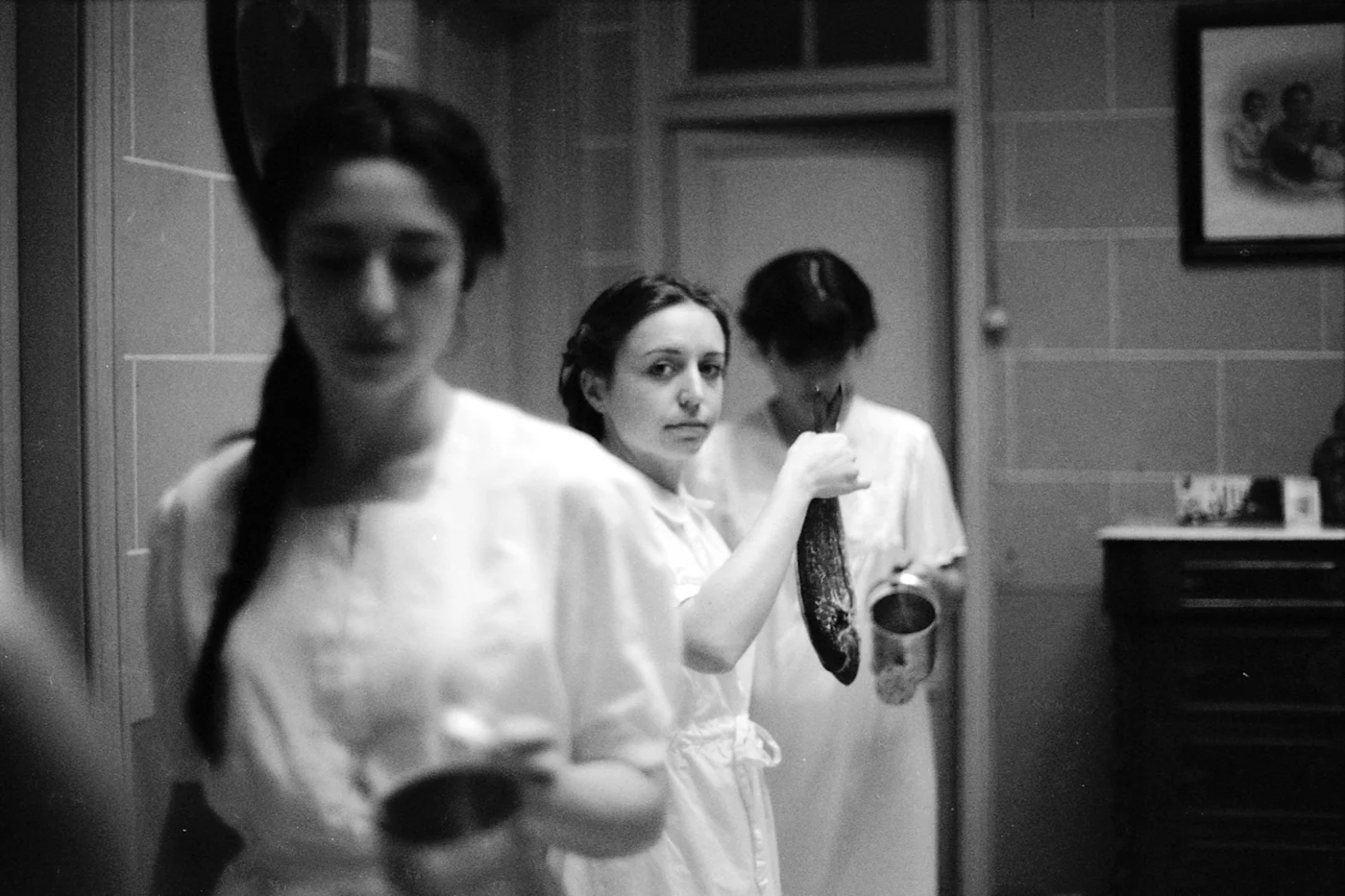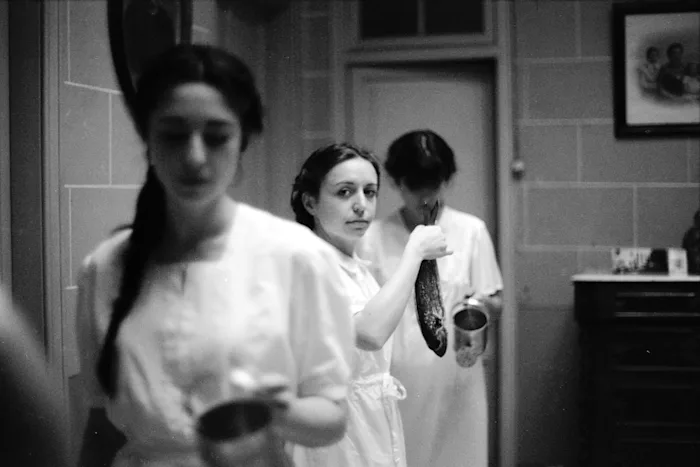The Irreducible Gap
Lea Melandri
Introduction
In a recent interview for e-flux, Lea Melandri elaborated on her relationship to other currents of the women’s movement in 1970s Italy. In her view, the projects she was involved with, such as the Free Women’s University and later the Lapis journal, presented “a challenge that was more radical [than Marxism] on questions of domination, exploitation, violence” as they showed that the “profound expropriation of women [was] not solely an appropriation of the female body as many other Marxist-feminists said at the time, but something deeper than this.” This refusal to submerge the framework of women’s liberation within either the metaphysics of the commodity or the historicist vocation of the class is by no means unusual for Melandri. Her interrogation of sexuality, love, and motherhood has long differentiated her from many Marxist feminists of her generation, for whom emphasis is largely placed on reproduction as work. This is true of the Wages for Housework campaign at the time, as well as many later preeminent critiques of primitive accumulation according to which the enclosure, devaluation, and expropriation of women’s reproductive labor served (and still serves) as the constituent matrix enabling the reproduction of capitalist labor power. Without abandoning the insurgent communist movement of her time, Melandri nevertheless accuses this analysis of being inadequate to the broader question of gender, since it fails to challenge the misogyny underwriting Marxian economistic thought more broadly.
For Melandri, economistic epistemology is marked by a constitutive misrecognition of female sexuality, which it incorrectly assimilates to male sexuality. When Friedrich Engels asserts that woman is essentially the proletarian of the household, he ignores, among other things, the intricacy of the individual, reducing it to a class position. Why, Melandri asks, is it necessary to idealize the class form at the expense of the complex reality of social contradictions?
“The Irreducible Gap” takes aim not only at Marxian economism but psychoanalysis as well. In the 20th century, many critical theorists, including Herbert Marcuse, Erich Fromm, and Louis Althusser synthesized Marx and Freud in various elements of their work. These works constituted an important intervention into the status of subjectivity in Marx’s materialism and the communist movement more generally, but also tended to fall flat when called to account for the idiosyncrasies of subjecthood beyond the economic sphere. In her critique of one such Freudo-Marxian synthesis, Jean-Joseph Goux’s Freud, Marx: Economie et symbolique (1973), Melandri shows how a tendency to translate metaphors found in Marx, Engels, and Freud into systematic parallels between the libidinal and political economy repeatedly subordinates the question of patriarchy to the terms of economic structures. On the other hand, the exaltation of motherhood by psychoanalysts such as Melanie Klein tends to ignore the gendered terms of its production, a misrecognition that likewise results in an erasure of the individual. In this, Melandri echoes Simone de Beauvoir, writing that, “from the moment when her body becomes material for the reproduction of the species and object of the sexual satisfaction of the man, the woman loses her autonomy.”
In sum, the relegation of gender and sexuality to the margins of materialism has impoverished it as an analytic method, by depriving it of key sources and supports. The interplay between gender, the unconscious, and political economy does not lend itself to the privileging of one realm over the other. However, for Melandri, the lesson to be drawn from the critique of economism is not to discard materialism but to expand it, to reveal the irreducible plurality of the antagonisms that drive it forward, the better to attack the violence that engulfs us.
Similar themes recur in other essays that appeared alongside the present one in the 1977 anthology L’infamia Originaria, several of which have recently appeared in English. In “Personal Modification is not Revolution,” we find a reflection on group psychoanalysis frustrated by an emphasis on personal enlightenment rather gender analysis, whereas “The Original Infamy” offers a searing critique of the “fictitious solidarities” (such as a totalizing economic class) that emerge from the bourgeois suppression of sexual difference, zeroing in on men’s survival needs as contingent on the submission of women.
“The Irreducible Gap” concludes by returning to the theme of survival as it relates to sexuality, and the refusal of dominant forms of subjectivation. Already in 1977, it was apparent that “the worker no longer wants to be a worker…the woman no longer wants to be a mother” — statements that have only become more true since then, and which must be reconsidered in light of the inadequacy of false separations and inverted hierarchies on which they depend. It is crucial today that we not only refuse dominantly imposed identities and categorical distinctions that no longer serve us, but also forge a new critical framework that does.
—Leijia Hanrahan, March 2022
The economic and the sexual orders reciprocally determine one another, but every trace of this originary implication appears to have been lost.
The disregard of female sexuality, combined with the forcible consignment of women to the economic order, as producers of children and sexual commodities, has separated them from the economico-political context, relegating one of the material causes of survival outside of consciousness. The man-woman relationship has passed into the shadows: it presided over the formation of institutions like the family and the school, essential but marginal in relation to the productive cycle, and acted indirectly on all the historical forms of aggregation, and still its only recognized form has become the private sphere — neurosis and madness.
Confronted with this consciousness, which arises clearly today only within the women’s movement, rigid Marxist theory (infrastructure, superstructure) collapses, and with it the omni-interpretative voracity of psychoanalysis. It is no longer enough to be content to point out “parallelisms,” “homologies,” or “nexologies” between economic organization and sexual organization.
The negation in human history that has opposed matter and spirit, idealism and materialism, nature and culture, the individual and society, etc., is not simply the fruit of a repressive social order, or an ideological cover for economic privilege. It is the symptom of an original action intended to open a deep rift in the order of the material conditions of existence, such that certain conditions come to be recognized while others are not.
The original infamy is a drama whose protagonists are beginning to be seen today.


The materialist analysis of the relations of production and the discovery of the sexual history that has kept the human species alive each occurred at separate moments not only in time (Marx, Freud), but also in the partiality that characterized each of them. The various aspects of negated materiality, which are always multiple and connected to each other, do not seem to bear the consciousness of their contemporaneity within them.
On the other hand, one material order cannot erase or diminish another without itself running the risk of becoming partly abstract and imaginary.
The search for links that might put an end, at least on a theoretical level, to the separation between the various moments of social organization has thus far avoided neither partiality nor abstractness.
For example, take the essay “Numismatics,” by Jean-Joseph Goux. The author writes that,
Starting from a science of money, we can trace the homologous articulations of all symbolic organizations in a society. [...] The institution of the Father, Phallus, and Language, of the major “signs” that regulate the values market, in fact stems from a genesis whose necessity and whose limits are doubtless most pronounced, theoretically, in the origin of Money.1
Goux’s syntax, which likes to present itself as assembled from various registers (“homologies,” “isomorphisms,” “parallelism”), in the end turns out to have one main driving propensity: the economic order.
From the discovery of the correspondences between different orders (economic, sexual, linguistic, etc.) to the affirmation that the monetary economy must necessarily be the determining and formative element of the whole social organism: such a logical leap attests, once again, to a normative a priori that escapes all analysis. The isomorphisms that Goux traces with Byzantine patience confirm, if there were any need, that man, in reconstructing the genesis of his history, cannot avoid adopting the perspective through which it unfolded. So it is for Marx and Freud alike.
The analysis that describes the origin of the money-form and that which discovers in sexual history the primacy of the father and the phallus both succumb to the same limitation: they destroy the fetish, but end up lending credence to an order that they discover to be already there.
What is presented as an outcome is present from the start: it is the result of a process, but it is also the internal reason for the development of the process itself.
Rather than being the original structure and model of all other analogous formations, certain of the oppositions (real or ideological) that are found in the writings of Marx and applied to the economy (use value, exchange value, etc.) themselves seem, at least in part, to be the result of commonplaces characteristic of the only culture that enjoyed a voice in history, that of man.
In fact, what Goux translates into a complex system of parallelisms and deductions appears in Marx and Freud only in the sporadic form of metaphors; he never seems notice that, in their use of metaphor, the different “registers” of the symbolic (economic, political, sexual, etc.) become almost interchangeable. As a result, not only does it become problematic to establish priorities, but we might even conclude that symbolic organization as a whole refers to an origin that is located outside of itself, and that, precisely for this reason, explains its existence.


Sexual history is marked by two essential facts:
The negation of feminine sexuality.
The displacement of sexuality out of the productive sphere specific to man.
It is in these, much more than from the development of the monetary economy, that philosophical oppositions between matter-spirit, heaven-earth, sacred-profane, individual-society, etc., have their origin.
The very formation of the general equivalent (exchange value) appears to itself be modeled on unconscious traces of the affair between the two sexes: separation from concrete particular products, externality, opposition.
Confirmation of this hypothesis can be found, implicitly, in Goux's account of the genesis and meaning of the “symbolic function” as the basis of all social exchanges:
To maintain or isolate a value, a meaning, an essence across the multiplicity of its possible incarnations. […] To identify, despite and even across an irrelevant diversity. To generate a rift between essence and phenomenon, between form and matter, value and support. [...] A process of replacement, of one thing set in place of another, of identification, substitution [...] A rift, whether understood or left implicit, between an invariant and a matter.2
If the simplest exchange between two commodities and “the equation of equivalence (A = B) that this implies” already includes the split between “invariant” and “matter,” it is clear that the “symbolic function” that Goux wishes to position as the basis of the entire historical-social process — the universal equivalent of money — is itself influenced in turn by the form that the man-woman relationship has historically taken: the substitution of female sexuality, its assimilation with male sexuality, the identification that takes place despite all difference, the separation between a (masculine) value and a matter that loses its consistency and finds itself overshadowed, and the indexing of an easily interchangeable commodity (the female body) to an invariant.
Money must negate itself as a commodity in order to become an external intermediary, opposed to all other commodities. From the desire to possess a particular good, we pass to the desire for enrichment as such; money becomes the absolute object of desire.
This is Marx's analysis. To this, Goux adds: “this dialectic is none other than the shift from need to desire” by which the phallus becomes the “universal signifier of jouissance.”3 Here “isomorphism” no longer suffices as an explanation.
The desire that detaches itself in order to assume the role of universal norm (the phallus) is male sexuality, whose autonomy is defined the moment that it leaves to the woman the task of ensuring survival (survival of the species, but also satisfaction of the need for love).
The act by which the father and the phallus become universal referents is positioned at the origin of history and radically determines its development, but it is also outside history until the protagonists become aware of it, until the man-woman relationship ceases to be a kind of history within history.
After all, even in the monetary economy the autonomy of gold is not the result of a process but is already present, in Marx’s description, in the particular natural properties of this metal:
Gold and silver...are not only negatively superfluous, i.e., dispensable articles, but their aesthetic properties make them the natural material of luxury, ornamentation, splendor, festive occasions.4
It is surely noteworthy that the more precious the metals are, the more isolated is their occurrence; they are found separately from the more commonly prevalent bodies, they are higher natures far from the common herd.5
Gold = festivals = joy = splendor. It is legitimate to think that the parallels are already drawn on the basis of a triumphant sexuality that separates and opposes need and desire, object and subject, activity and passivity, etc.; that separates gold, festivity, and phallic primacy as vertices of a pyramid whose base is still, in part, outside of history: the liberation of women, the enjoyment of commodities in their particular characteristics, the realization of subjects in their specificity as individuals and social beings, the variety of expressive forms against the tyranny of speech, autonomy against authoritarian centralization.
The allegedly materialist explanation of binomials such as body-soul, real-ideal, particular-universal, once these are referred back exclusively to the oppositions of money and commodity, use value and exchange value, opens the door to new idealistic reversals.
The indifferent becoming of matter and the predominance of consciousness, of abstract rationality, do not depend only on the logic of exchange and the organization of production. In the history of the relationship between man and woman, the same fate befalls female sexuality. From the moment her body becomes the matter for the reproduction of the species and object of man’s sexual satisfaction, woman loses her autonomy and her possibility of historical existence. Man himself, through the relationship that he continues to maintain with her, alienates and separates from himself, from his productive and social action, a part of his material existence (need for love, sexuality).
Idealism, the opposition between mind and body, rationality and matter, has its origin in a double occultation: the occultation of the woman's body, and of labor-power (commodity = labor).
But, chronologically, even before the commodity and the labor-power that produces it, the matter that finds itself negated in its concrete particular being, in its “relative plural form,” is the woman’s body. The woman who enters history has already lost her concreteness and singularity: she is the economic machine that preserves the human species and she is the Mother, an equivalent more general than money, the most abstract measure that patriarchal ideology has invented.
In her psychoanalytic considerations, Melanie Klein exalts the universal maternal presence to such an extent that she does not recognize the specifically masculine character of historically known production and creativity. The mother's body expands to cover everything to which man applies himself:
In the explorer's unconscious mind, a new territory stands for a new mother, one that will replace the loss of the real mother.
The sculptor who puts life into his object of art, whether or not it represents a person, is unconsciously restoring and recreating the early loved people, whom he has in phantasy destroyed.6
Maternal omnipresence is the maximal form of recognition, but also the greatest wrong that can be done to woman: to dilate her imaginary existence until she becomes the backbone of all that exists, at the same time as she is denied her real existence as an individual.
The terms of the thousand-year-old opposition that disavowed matter and conferred reality upon the imagination, creating an upside-down hierarchy, are both abstract postulates of a culture that has sought to do away with one of its main material supports.
As long as we continue to seek the answer to all antagonisms (real and ideological) exclusively, or even primarily, in the history of economic relations, we do not extricate ourselves from economism.


The women's movement has brought attention back to female sexuality and revived interest in personal histories so as to break away from idealism, both bourgeois idealism for which only generic “individual needs” exist, or the Marxist one, which reduces the needs of the individual to those relating to his or her class position.
About money, Marx writes:
Money is therefore the god among commodities [...] From its servile role, in which it appears as a mere medium of circulation, it suddenly changes into the lord and god of the world of commodities. It represents the divine existence of commodities, while these represent its earthly existence.7
The recourse to philosophical oppositions such as “heaven-earth,” “sensible-intelligible,” when adapted to the description of economic phenomena, albeit in the reversed form of a critique of idealism, is ripe for various explanations. The most immediate consideration to add here is that this reflects the internal contradictions of the existing economic order, such that Marx, while unmasking the idealistic deception, is still forced to repeat the terminology and the symbolic constructions it creates. On the contrary, we can think that, if idealism persists behind its reversal, it is because Marx takes into account only certain aspects of the displacement at work here, to the detriment of material causes of existence.
Beyond all metaphor, among the epigones of Marx, we may consider this excerpt from a speech on October 12, 1976 by Mauro Rostagno of Lotta Continua:
The individual conquers his individuality only by destroying, alongside his class, the determination that the opposing class has imposed on him. [...] I believe that the masses are the decisive and main source of real collective needs, and it is through class struggle that individuals learn to constitute their individual needs.
Materialism allows us, and the masses generally, to analyze such needs and desires.
Why was it necessary to idealize the “class,” to once again pay homage to abstraction by installing a revolutionary subject as the common denominator, against the complex realities and social contradictions of singular life?
The concept of the “mass” tends to be conflated with the Platonic idea of “matter” as an undifferentiated substance, which is more a reflection of a certain productive structure than its determining element.
Economism is the other face of idealism. The origin is the same: censorship, displacement, the reversal of reality into the imagination, and vice versa.
That these were the particular prerogatives of the “god of commodities,” Marx had no doubt:
I am ugly, but I can buy for myself the most beautiful of women. Therefore I am not ugly.
Money...the general confusing and confounding of all things.
Money [is] the external, universal medium and faculty...for turning an image into reality and reality into a mere image.8
As a product of the capitalist bourgeoisie, economism consists essentially in (i) an affirmation of the primacy of the economy understood as a technical moment and (b) the separation of the relations of production from any other form of exchange. The needs and interests that this separation allows to exist with a certain margin of autonomy are regulated by the capitalist economy itself, but with the implication they are totally different. Economic facts are made to appear, for example, as “objective,” “necessary,” susceptible to historicity, whereas all other events and relations appear on the contrary as “subjective,” “fortuitous,” “private.”
Historical materialism taught us that the economy “deals not with things but with people,” that behind the productive machine lies alienated human labor. In this sense, it laid down the groundwork for a critique of the supposed “naturalness” or “technical necessity” of economic history. But faced with the separations between economy-sexuality, public-private' etc., historical materialism ended up operating a simple reversal, integrating the second term into the first and thus suggesting that the order of objectivity, of necessity, of history, is exclusively that of political economy.
Here again, it is the dismissal of the male-female relationship that allows the old antagonisms to fall within the framework of “conscious materiality”: class needs and individual needs, political struggle and sexuality, structures and superstructures etc.
Economism and idealism are vices that the Marxist left has inherited from the bourgeoisie, but they are also, obviously, the extension of an older patriarchal privilege.
The confusion between economy and economism, individual needs and individualism, sexuality and intimacy, was born in the analyses of Marx and Engels — a fact we can perceive with all its contradictions only today.
Let us take The Origin of the Family, Property and the State. Here, Engels reconstructs the history of the family, of the relationship between man and woman, using the same interpretative categories that Marx had used for the analysis of economic exploitation.
When it is taken for granted that there is no specific difference between man and woman relative to sexuality, and that women’s sexuality coincides with men’s desire, the equivalence woman = proletarian becomes all too easy. The woman’s body as it appears on the social scene is already “other than itself.” She is essentially a labor force that produces children, housework, and pleasure for the man.
Male dominance does not therefore originate with private property and the monogamous family, as Engels says, but is located at the origin of the relationship between the sexes in an act of expropriation which is only now beginning to surface in consciousness.
With the dominance of male sexuality also comes the material and ideological primacy of economic relationships over all other social relationships.
In the rigid economic causality of Engels' analysis (the subjugation of women is born with private property and disappears with it), every omission and contradiction becomes indicative of the process by which the sexist structure simultaneously makes its appearance and disappears. Speaking of the high esteem enjoyed by women “among all savages and barbarians of the lower and middle stage,” Engels feels the need to emphasize “the very high esteem for women, that is, for mothers.”9 The fusion-confusion between sexuality-motherhood, sexuality-procreation, has already taken place. Elsewhere, Engels asserts that the monogamous family is born for economic reasons and that “its express aim is the begetting of children of undisputed paternity...in order that these children may in due time inherit their father’s wealth as his natural heirs” (ibid). This remark is then followed by reflections that contradict this reductive and partial interpretation, and that could instead open the way to a specific discourse on sexuality.
On the transition from group marriage to monogamy, he writes:
The more the old traditional sexual relations lost their naïve, primitive jungle character...the more degrading and oppressive must they have appeared to the women; the more fervently must they have longed for the right to chastity, to temporary or permanent marriage with one man only, as a deliverance. This advance could not have originated from the men, if only for the reason that they have never — not even to the present day — dreamed of renouncing the pleasures of actual group marriage.
From sexuality to economics:
[...] the once so easily obtainable wives had now acquired an exchange value and were bought.
This sacrificial surrender, originally obligatory for all women, was later practiced vicariously by these priestesses alone on behalf of all other women. […] Wage labour appears sporadically alongside of slave labour; and simultaneously, as its necessary correlate, the professional prostitution of free women appears side by side with the forced surrender of the female slave.10
But where the economistic forcing totally loses its credibility is in Engels’ description of proletarian marriage. Lacking property, the proletarian would have no reason to assert his dominance over the woman, apart from a certain “brutality” that has long been rooted in the monogamous couple. For this reason, “sexual love becomes the rule in relationships with women.” A love, it should be added, made up of many children, abortions, rapes, and deaths in childbirth. Quite an eccentric concept of “'sexual love”! One can agree with Engels that, the sexual relationship for the bourgeois woman, at least in the past, ended up taking a backseat to economic interests, to the ideal and moral reasons of the man. For proletarians, sexuality seems less hindered by extraneous concerns, yet the result, as far as women are concerned, is no less violent.
In order to triumphantly elevate the happy love of proletarian women, it is necessary not to have any doubts about the identification between pleasure and male sexuality, and not to want to see that the less a woman's sexuality is covered by other structures (material, religious, ideological) the more it reveals its violent and forced kinship with motherhood, illness and death.


The moment in which the man-woman relationship loses its specificity is clearly defined by certain postulates of equivalence: subordination of women = division of labor = class antagonism:
The first class antagonism that appears in history coincides with the development of the antagonism between man and woman in monogamian marriage, and the first class oppression with that of the female sex by the male.11
From Engels to Goux:
Genetically, social antagonisms develop in the image of sexual and family antagonisms, but structurally in developed society, it is family antagonisms which are, in the reduced image, the reflection, the simple scenic representation of social antagonisms. The opposition of the sexes is perhaps the germ of the class struggle; the opposition of the sexes is today the mirror of the class struggle.”12
According to Goux, the male-female relationship loses its relevance and autonomy as soon as the modes and relations of production become more complex, more specific and more autonomous with respect to parental ties. Between the two “signifying levels” a gap is created whose fundamental consequence would be the subordination of the conflict between the sexes to the broader social conflict between classes.
Now, if it is true that the economic machine tends to absorb all other social productivity, to regulate and subordinate to itself every other social order, it is also true that the man-woman relationship opposes to this incorporation its own specificity and structural autonomy.
Not only capitalist society, but also the Marxist political tradition, have constantly attempted to reduce the effect of this gap, the separation between one order and another.
In both cases, the result has been the ideologization of everything related to sexuality and the disregard of the material weight that the relationship between the sexes carries within the overall social context.
Today, the irreducibility of one material order to another is becoming increasingly evident. By contrast, what seems to be diminishing is the difference between the bosses [padroni] and their opposition which share a common subjectivation to the law of the market, each consenting to the idealistic duty that positions sexuality among cultural, ethical and psychological problems.
Even Goux's attempt to trace, in the Freudian discovery, Marx’s materialist reversal of the relations of production only winds up reinforcing the conviction that social conflict has its center in economic relations.
In his elaboration of juxtapositions and parallels, Goux even combines — through a facile recourse to etymology — “mother,” “matter,” and “mass.”
Likewise, the possibility of establishing a “homology” between wage labor (economic production) and motherhood (reproduction of the species), both repressed and subject to erasure by idealist ideology, arises from the application of a single interpretive criterion that is still essentially economic.
As far as sexuality is concerned, “the materialist reversal” does not coincide with the discovery and valorization of the material production of women, of their being mothers, as when the masses discover themselves to be the productive, value-generating labor force.
For women, sexist violence has meant that their existence depends upon their possession by men, that they can only represent their sexuality through the models afforded by men, that they only acquire value as a place inhabited by men. The antagonism is not between maternal function and paternal function (matter-spirit) because the mother participates, even in a conflicting and contradictory mode, in the order established by the father. The antagonism is between the woman and the man, between a sexuality that is imposed and a sexuality that finds itself canceled, between a productive capacity that has been able to expand in the most diverse forms and a productivity reduced to its biological function.
Only if we keep this in mind can we escape the perspective of economism, with its simplistic parallels that make women the workers of the household and men a petty domestic boss, like a “staging” of great social conflicts.
When the reduction of feminine sexuality to a biological and economic function has already occurred as the result of an original violence, situated outside the consciousness (but not outside the body) of woman herself, it is inevitable that the same interpretative categories of the material force of producing of social goods comes to be applied to what is considered the specific productivity of women.
Even when there is a materialist consciousness of the male-female relationship, the difficulty remains of rethinking economic history as the history of a male doing, which bears the traces of his victorious sexuality. As we have seen, the search for parallelisms rather than implications turns out to be equivocal: firstly, because it recreates an artificial separation; secondly, because the economic order, unable to question itself about its deep origins, including the conditioning deriving from sexuality, ends up invading, dictating laws, and removing all specificity from every other type of problem.
Thus, what was supposed to be an opportunity to extricate productive activity from an alienated separation can become the source of new idealisms that transform individuals — before they can effectively reclaim their work and their needs — into machines producing new ideologies and new structures of power.
Obviously, it is not enough to reverse the hierarchical symbolic order that has placed the profiteer, the father, the mind and history at its apex. The worker no longer wants to be a worker, that is to say he wants to produce differently and live all his social relations differently; the woman no longer wants to be a mother in the sense that she must make procreation an alienated production of survival for herself and for her man.
It is no longer just a question of discovering the material supports of economic and sexual survival, but of rethinking survival from the consciousness that we are beginning to have today of the impossibility of separating sexuality and economics, sexuality and politics, sexuality and culture, etc.
First published in L’erba voglio, 1977. Reprinted in L’infamia Originaria, Edizioni L’erba voglio, 1977. Edited and translated by Howard Slater, Leijia Hanrahan, and Ill Will.
Images: Anna Torres Balaguer
Notes
1. Jean-Joseph Goux, “Numismatics” in Symbolic Economies: After Marx And Freud, Cornell, Ithaca, 1990, 34, 13. ↰
2. Goux, Symbolic Economies, 222-224. [Translation modified to suit the Italian.—Eds.]↰
3. Goux, “Numismatics,” 35.↰
4. Karl Marx, A Contribution to the Critique of Political Economy, Charles H. Kerr Publishing, 1904, 211.↰
5. Karl Marx, Grundrisse: Foundations of the Critique of Political Economy, Penguin, 1973, 105.↰
6. Melanie Klein, “Love, Guilt and Reparation and Other Works 1921-1945,” in The Writings of Melanie Klein, Vol. 1, The Free Press, 1975, 334-335.↰
7. Karl Marx, Grundrisse: Foundations of the Critique of Political Economy, Penguin, 1973, 221.↰
8. Karl Marx. Economic and Philosophic Manuscripts of 1844, Progress Publishers, 1959, 60-61.↰
9. Friedrich Engels. The Origin of the Family, Private Property and the State, Resistance Books, 2004, 60.↰
10. Engels. The Origin of the Family, 63, 65, 74.↰
11. Engels. The Origin of the Family, 73.↰
12. Jean-Joseph Goux, Freud, Marx, Feltrinelli, 1976, 188. [We were unable to locate the corresponding passage in English. —Eds.] ↰